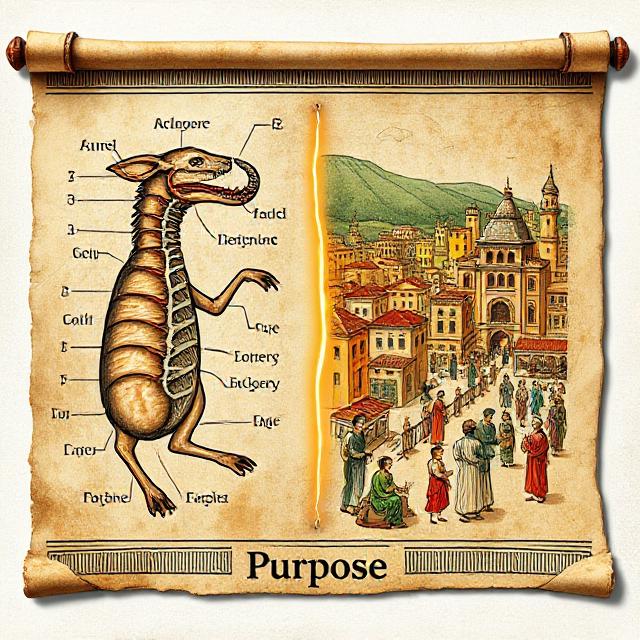
Table of Contents
Aristotle Biology and Ethics: One Philosopher, Two Legacies
Aristotle—student of Plato, tutor of Alexander the Great, and founder of the Lyceum—left a mark on philosophy so wide-reaching that it spans from plant taxonomy to political theory. But nowhere is his influence more pronounced than in the twin domains of biology and ethics.
Unlike Plato’s emphasis on abstract ideals, Aristotle turned to empirical observation. He believed knowledge must be derived from what we can see, touch, dissect, and reason about. This made him not only a philosopher, but arguably the first biologist in history, and the architect of an ethical system still studied today: virtue ethics.
I. The Origins of Biological Inquiry
While Plato discounted the sensory world as an illusion, Aristotle revered it as the foundation of knowledge. His naturalistic approach led him to compile extensive records on flora, fauna, and anatomy.
He classified over 500 species and dissected animals to understand their organs and functions. His observations of octopuses, sea urchins, and bees were detailed enough to astonish modern zoologists.
Key biological contributions include:
- Teleology: The idea that organisms have a purpose or end (telos) for which they exist.
- Scala Naturae: A hierarchy of beings from simplest to most complex, with humans at the top.
- Classification: Grouping organisms by shared characteristics—a precursor to Linnaean taxonomy.
Though many of his details were later corrected, his methodological contribution was pivotal: systematic observation and categorization of living things.
II. Teleology: Purpose in Nature
One of Aristotle’s most enduring biological insights was teleology: the idea that nature acts with purpose. For him, a bird has wings in order to fly, and teeth exist for chewing.
Today, we might substitute evolutionary adaptation for teleology, but Aristotle’s intuition was ahead of its time. He grasped that form followed function, and that organisms were structured to fulfill specific ends.
This teleological view also bled into his ethical thinking, where the human telos became central.
III. The Ethics of Flourishing: Eudaimonia
In Aristotle’s ethics, teleology plays a moral role. Just as an acorn has the telos to become an oak, a human has a telos to become fully actualized.
This state is called eudaimonia, often translated as “flourishing” or “well-being.” It is not fleeting pleasure or momentary happiness, but a sustained life of virtue and reason.
Aristotle outlines his ethics in the Nicomachean Ethics, where he identifies:
- Virtue (arete) as a mean between extremes (e.g., courage between rashness and cowardice)
- Practical wisdom (phronesis) as essential for moral action
- Habituation as the method by which virtues are developed
Aristotle’s ethics is not about rules or consequences—but about character and purpose. Ethics, like biology, is about the form and function of a being striving toward fulfillment.
IV. Biological Analogies in Ethics
Aristotle often used biological analogies to explain moral ideas. Just as a plant needs sunlight, soil, and water to flourish, humans need education, friendships, and community.
He saw ethical development as growth: a progressive actualization of inherent potential. Just as a malformed limb thwarts bodily function, a malformed character thwarts moral function.
This integration of biological and ethical insight made his philosophy uniquely holistic.
V. Politics, Ethics, and the Human Animal
Aristotle famously described humans as “zoon politikon”—the political animal. Because we have language and reason, we form communities, laws, and institutions.
He believed ethics could not be separated from politics, because humans realize their moral potential in society. Like a cell in an organism, a person must function within the polis to flourish.
Thus, his ethical theories dovetail with his biological understanding: both frame humans as natural entities with social and rational functions to fulfill.
VI. Legacy in Science and Moral Philosophy
Aristotle’s biological works influenced thinkers well into the Renaissance. His classifications, though later revised, dominated scientific thought for centuries.
His ethical framework inspired:
- Thomas Aquinas, who merged Aristotelian ethics with Christian theology
- Modern virtue ethics, revived in the 20th century by philosophers like Philippa Foot and Alasdair MacIntyre
- Medical ethics, where the concept of flourishing applies to health and well-being
His method of observing life carefully and reasoning about it morally laid the groundwork for both empirical science and character-based morality.
VII. Criticisms and Modern Reflections
Some criticisms of Aristotle’s biological theories include:
- Overreliance on purpose (teleology) without empirical cause
- Anthropocentrism: placing humans at the pinnacle of nature
- Lack of experimentation and control groups
His ethics, too, has been critiqued:
- Vagueness in defining eudaimonia
- Cultural bias in defining virtues
Yet, in both fields, Aristotle’s core idea endures: understanding what something is means asking what it is for.
VIII. Conclusion: Aristotle’s Unified Vision
Aristotle biology and ethics represent two faces of the same coin: a quest to understand life in both its physical and moral dimensions.
By observing nature and human behavior with the same rigor, Aristotle offered a unified framework where purpose, function, and flourishing are central.
He reminds us that knowledge is not divorced from values. How we understand the natural world influences how we understand ourselves—and vice versa.
In every biology textbook, in every ethical debate, Aristotle’s spirit lives on: asking not only what things are, but what they are for—and how we might best live in accord with that purpose.
